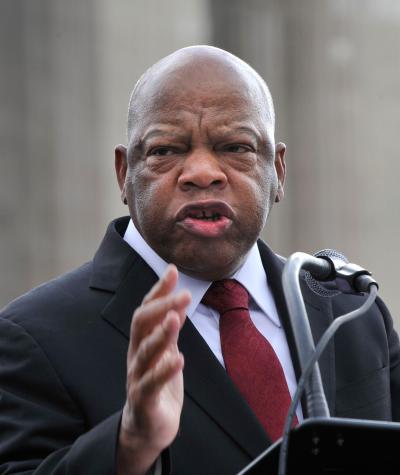By Nicholas Anway, a Summer 2021 CLC law intern
No matter our race, background or zip code, for our democracy to work for us all, it must include us all. Yet, since the 2020 election, some states are making it harder to vote, especially for Black, young and new Americans.
When politicians put up deliberate barriers to silence voters’ voices based on what they look like or where they live, Congress must act. One solution: Pass the John Lewis Voting Rights Advancement Act.
Named after John Lewis, the late Georgia congressman and civil rights hero, the Act would prevent future attempts to erect discriminatory barriers to the freedom to vote. It adds new voting protections for Indian tribal lands—equal access to voter registration, polling places, early voting locations and absentee ballots. And it requires that states implement transparency protocols to inform their residents when voting laws in the state are changed.
It does so by amending and restoring the Voting Rights Act (VRA) of 1965, the landmark law prohibiting discriminatory voting rules, which had for decades restricted the rights of voters of color and voters who speak a language other than English as their primary language to cast their ballots freely, safely and equally.
The original VRA, one of the proudest achievements of the 1960s civil rights movement, was signed into law in the months following the public outcry to Bloody Sunday. On that day, March 7, 1965, Lewis and around 600 other peaceful voting rights activists were viciously attacked by police while crossing the Edmund Pettus Bridge in Selma, Alabama during the Selma to Montgomery march. In a June 2020 interview, Lewis reflected: “I was beaten, left bloody and unconscious. But I never became bitter or hostile, never gave up. I believe that somehow and some way if it becomes necessary to use our bodies to help redeem the soul of a nation, then we must do it.” Six days after Bloody Sunday, President Lyndon B. Johnson pledged his support for the VRA.
The Voting Rights Act proved to be one of the most successful civil rights laws in our nation’s history. The heart of the Act was Section 5, which required that jurisdictions determined to have a history of racial discrimination in voting to preclear any proposed changes in voting laws with the Civil Rights Division of the Justice Department or a federal court in Washington, D.C. In other words, state and municipal governments had to show that a voting change would not have a discriminatory effect before it could be enacted.
Section 5 brought constitutional protections to life for minority and historically excluded communities to choose their preferred candidates. For example, in 1965 there were only five Black Americans in the U.S. House and Senate combined. Today, there are 60. And since 1965, Black Americans went from holding fewer than a 1,000 offices nationwide to over 10,000.
Due to its success, the Voting Rights Act has been reauthorized and amended five times since 1965 with large, bipartisan majorities. In 2006, its most recent reauthorization passed the Senate 98-0 without a single dissenting vote.
But despite its bipartisan support in Congress, the U.S. Supreme Court gutted a key provision of the VRA in its 2013 decision in Shelby County v. Holder. In an opinion written by Chief Justice John Roberts, the Court held that the “coverage formula” used to determine which states and localities would be subject to the preclearance requirement was unconstitutional, rendering Section 5 ineffective.
The Shelby County decision gave a green light to states and localities to create discriminatory barriers to voting that would not have passed preclearance review. Immediately after the decision, for example, North Carolina passed a comprehensive anti-voter law that limited early voting, imposed restrictions on voter-registration drives, eliminated election day voter-registration, and imposed one of the strictest voter-ID rules in the country.
Worse still, in 2021, the Supreme Court further weakened the VRA in Brnovich v. Democratic National Committee, making it more difficult—though not impossible—to bring and win voting discrimination lawsuits under Section 2 of the law.
The U.S. Supreme Court’s continued erosion of the VRA’s voter protections underscores how important it is for Congress to act to protect the freedom to vote.
The John Lewis Voting Rights Advancement Act is an urgent step towards that end.
The Act remains popular. Polling shows that large majorities of Americans believe the Voting Rights Act is still needed and support Congress passing the John Lewis Voting Rights Advancement Act. And over 150 the nation’s largest employers have expressed support for its passage.
In his 2017 memoir, John Lewis wrote of freedom: “Freedom is the continuous action we all must take, and each generation must do its part to create an even more fair, more just society.” It is precisely such an action that Congress must again take to protect the freedom to vote for all Americans. Congress must pass the John Lewis Voting Rights Advancement Act.
